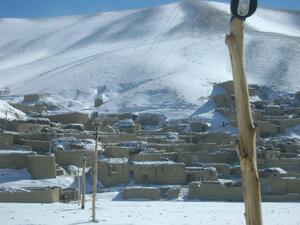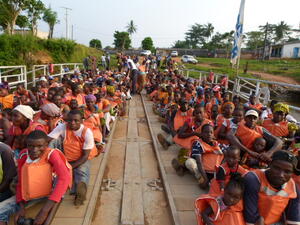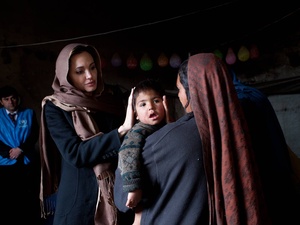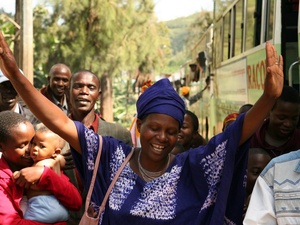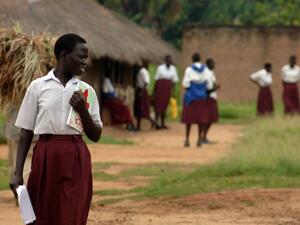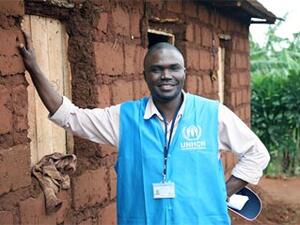Burundi reintegration to receive $300,000 boost from OPEC Fund
Burundi reintegration to receive $300,000 boost from OPEC Fund

Burundian returnees arriving back in the north, where the OPEC Fund for International Development has committed $300,000 for reintegration projects.
GENEVA, March 18 (UNHCR) - The UN refugee agency announced today that the OPEC Fund for International Development has agreed to contribute $300,000 to support UNHCR's efforts to help Burundian refugees reintegrate in their homeland.
At a briefing for journalists on Friday, UNHCR spokesman Ron Redmond said the funds would be used to finance an urgent operation to assist some 4,000 families who recently returned to two provinces in north-eastern Burundi.
Voluntary repatriation to Burundi is one of UNHCR's largest return programmes in Africa. The refugee agency helped to repatriate some 90,000 Burundian refugees from neighbouring Tanzania last year. Over 12,000 of them went back to Muyinga province, another 6,000 to neighbouring Kirundo.
The north of Burundi is agriculturally rich, traditionally the breadbasket of the country. There are, however, growing concerns about a very severe food shortage brought about by late rains and lack of seeds, affecting the whole of Burundi and especially the north-eastern provinces. Muyinga and Kirundo have been badly hit. The World Food Programme (WFP) and the Food and Agriculture Organisation (FAO) have announced that 2 million people in Burundi will need food assistance this year.
Lack of food affects the community as a whole, and can be especially devastating for returnees who are trying to make a new start in their homeland. Often, lack of food is linked to a host of other problems endemic in countries recovering from years of conflict and civil strife: destroyed infrastructure, lack of potable water, poor health care and education.
UNHCR's "Assistance to Sustainable Return and Reintegration in Burundi" aims to help tackle such problems. The agency's sustainable reintegration programmes include the construction of shelter and rehabilitation of schools and health centres, as well as landmine clearance. The absence of adequate housing is one of the biggest challenges refugees face upon their return to Burundi. After years of absence, most find their homes destroyed, and have nowhere to stay. UNHCR provides families in need with material that they cannot easily procure given their very limited means: iron sheets for roofing, locally produced doors and windows, and tools. The families then build their own houses. Single women, the ill and the elderly get help with the building work.
UNHCR also supports income-generating projects, helping the development of small to medium enterprises that use, create and market local produce and resources. The refugee agency also runs short-term vocational skills training in cooperation with other partners, and helps returnees to set up small businesses. Women are given priority for such projects.
Where resources are scarce, tensions between the local community and returning refugees often arise. In order to reduce such tensions, UNHCR's projects aim to benefit the whole community. Their primary focus is on vulnerable people, including families headed by a single person, women, and the elderly. Where necessary, UNHCR also runs reconciliation projects to bring the community together.
The nationwide referendum in February this year paved the way for general elections later in the year in Burundi. Provided that progress towards peace and stability continues, UNHCR plans to assist 150,000 refugees to return to the country in the course of 2005. With such large numbers coming back, reintegration and long-term development programmes are key priorities.
This is the first time that the OPEC Fund for International Development is supporting UNHCR's reintegration and reconstruction work. In 2001, at the peak of the Afghan crisis, the Vienna-based organisation contributed $200,000 to help UNHCR meet the basic needs of Afghan refugees. UNHCR hopes that this new collaboration to support long-term reintegration will be the start of a solid working relationship between the two organisations. Negotiations are currently underway on joint projects to combat HIV/AIDS in Africa.
The OPEC Fund for International Development is an inter-governmental development finance institution established in 1976 by the member states of OPEC (Organisation of the Petroleum Exporting Countries). It aims to promote cooperation between OPEC member countries and other developing nations, particularly the poorer, low-income countries in pursuit of social and economic advancement.



